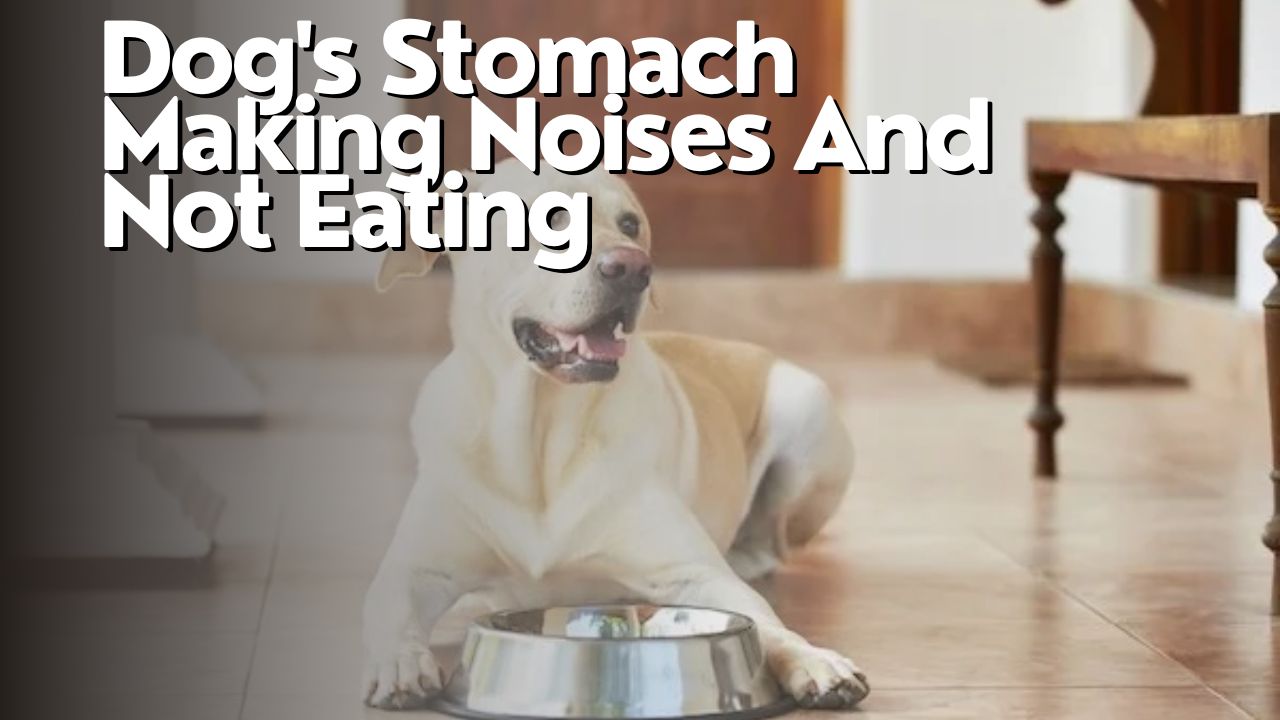Hey there, have you ever noticed your dog’s stomach making weird noises and not wanting to eat? Well, I’ve been there, and let me tell you, it can be a cause for concern.
As a dog owner myself, I understand the worry that comes with seeing your furry friend’s appetite change. That’s why I’ve put together this article to shed some light on the possible reasons behind these issues.
In this article, we’ll explore common causes for a dog’s stomach making noises and refusing food. Sometimes, it’s as simple as hunger pangs or an upset stomach. Other times, it could be a sign of stress, anxiety, or an underlying health condition.
It’s important to know when to seek veterinary care to ensure the well-being of your beloved pup.
So, if you’re curious about what might be causing your dog’s tummy troubles, keep reading. We’re here to help you understand and address this issue.
Hunger Pangs and Digestive Noises
The dog’s stomach is rumbling and growling due to hunger pangs, and it is not showing interest in eating. As I sit here and listen to the noises coming from my furry friend’s tummy, I can’t help but feel concerned.
It’s been hours since he last ate, and his appetite seems to have disappeared completely. I’ve tried offering him his favorite treats and even his regular meals, but he simply turns his nose up and walks away. It’s frustrating and worrisome to see him like this.
I wonder if his lack of appetite is due to something more than just hunger. Maybe he’s not feeling well or has an upset stomach. I decide to monitor him closely for any other signs of discomfort or illness. I make sure he has access to fresh water and a comfortable place to rest, hoping that whatever is bothering him will pass soon.
In the meantime, I try to keep his environment calm and stress-free. I know that stress can affect a dog’s appetite, so I make an effort to create a soothing atmosphere for him. I offer him some gentle belly rubs and keep his routine as consistent as possible.
I hope that his appetite returns soon, and his stomach stops making those loud and unsettling noises. It’s hard to see my furry companion not eating, but I’ll do whatever it takes to help him feel better.

Upset Stomach and Digestive Issues
Feeling a rumble in my belly and experiencing discomfort, it’s no wonder my appetite is lacking. An upset stomach can be a common cause for digestive issues in dogs. There are a few possible reasons for this, including dietary indiscretion, food allergies, or even an underlying medical condition.
When my stomach is upset, it can lead to excessive gas, bloating, and loud digestive noises. It’s not only uncomfortable for me, but it can also be concerning for my owner.
To help alleviate my upset stomach, my owner can try a few things. First, they can try feeding me a bland diet of boiled chicken and rice, which is easy on the stomach. They should also make sure that I am well-hydrated and avoid giving me any table scraps or treats that could further irritate my stomach. If my symptoms persist or worsen, it’s important for my owner to take me to the vet for a thorough examination.
Overall, an upset stomach can be a common issue for dogs, leading to a lack of appetite and loud digestive noises. With the right care and attention from my owner, I can hopefully find relief and get back to enjoying my meals.
Stress and Anxiety
When it comes to our furry friends, it’s important to understand the connection between emotions and digestion. Dogs, just like humans, can experience stress and anxiety. This can have a direct impact on their digestive system.
By identifying the stress triggers in our dogs’ lives, we can help alleviate their upset stomachs and promote overall well-being.
The Connection Between Emotions and Digestion
Did you know that your emotions can actually have an impact on your digestion? It’s true! When we feel stressed or anxious, our body goes into a fight-or-flight mode, which can disrupt the normal functioning of our digestive system. Here are three ways emotions can affect digestion:
- Decreased blood flow: When we’re stressed, our body directs blood away from our digestive organs, leading to decreased enzyme production and slower digestion.
- Increased stomach acid: Anxiety can stimulate the production of stomach acid, leading to heartburn and discomfort.
- Changes in gut bacteria: Emotions can alter the balance of our gut bacteria, which play a crucial role in digestion. This imbalance can result in bloating, gas, and other digestive issues.
So, it’s important to manage our emotions and find healthy ways to cope with stress to maintain a healthy digestive system.
Identifying Stress Triggers
To identify stress triggers, I can start by paying attention to the situations and people that make me feel overwhelmed or anxious. It’s important to listen to my body and notice any physical or emotional changes that occur in response to certain triggers.
For example, if I notice that my heart starts racing or my stomach starts churning whenever I have to confront a certain person or be in a particular situation, it could be a sign of stress.
Additionally, keeping a journal can be helpful in identifying patterns and triggers. By writing down my thoughts, feelings, and reactions in different situations, I can start to see common themes and better understand what causes my stress.
Ultimately, identifying stress triggers can empower me to make positive changes and find healthier ways to cope.
Underlying Health Conditions
If your dog’s stomach is making noises and they aren’t eating, it could be due to underlying health conditions. While stress can be a common cause of stomach issues in dogs, it’s important to consider other possibilities as well. Here are three potential underlying health conditions that could be causing your dog’s stomach to make noises and affecting their appetite:
- Gastrointestinal Infections: Infections such as gastroenteritis or parasites like worms can cause stomach noises and appetite loss in dogs. These infections can be accompanied by symptoms like diarrhea, vomiting, and abdominal pain.
- Pancreatitis: Pancreatitis is an inflammation of the pancreas and can cause digestive issues in dogs. Symptoms include stomach noises, lack of appetite, vomiting, and lethargy. This condition can be triggered by a high-fat diet, certain medications, or underlying health conditions.
- Intestinal Blockage: If your dog has ingested something indigestible, it can lead to an intestinal blockage. This can cause stomach noises, loss of appetite, vomiting, and constipation. It is a serious condition that requires immediate veterinary attention.
If your dog’s stomach is making noises and they aren’t eating, it’s important to consult with a veterinarian. They can perform a thorough examination, run diagnostic tests, and provide the appropriate treatment to address the underlying health condition and alleviate your dog’s discomfort.
When to Seek Veterinary Care
When it comes to our furry friends, it’s important to know when to seek veterinary care.
Signs of a serious issue, such as persistent stomach noises and a lack of appetite, should not be ignored.
Consulting a veterinarian is crucial to ensure our dog’s health and well-being.

Signs of a Serious Issue
Despite the rumbling sounds coming from my furry friend’s stomach and his lack of appetite, it’s crucial for me to be aware of the signs that indicate a more serious underlying issue.
One of the signs to watch out for is persistent vomiting. If my dog is vomiting repeatedly or if there is blood in his vomit, it could be a sign of a serious problem.
Another red flag is diarrhea that doesn’t go away after a day or two. If my dog’s diarrhea is accompanied by lethargy, dehydration, or a loss of appetite, it’s time to seek veterinary care.
Additionally, if my dog shows signs of abdominal pain, such as whining, restlessness, or a hunched posture, it’s important to get him checked out.
Being attentive to these signs can help me identify any serious issues and ensure my dog receives the necessary medical attention.
The Importance of Consulting a Veterinarian
After noticing signs of a serious issue with my dog’s stomach, such as excessive noises and a lack of appetite, I realized the importance of consulting a veterinarian. As a responsible pet owner, it was crucial for me to seek professional help to ensure the well-being of my furry companion.
Consulting a veterinarian is essential because they have the knowledge and expertise to diagnose the underlying problem accurately. They can perform a thorough examination, conduct necessary tests, and provide appropriate treatment options.
Furthermore, a veterinarian can offer valuable advice on how to manage my dog’s symptoms and prevent future issues.
Ignoring the signs and attempting to self-diagnose can lead to complications and worsen the situation. It is always better to trust the professionals who have dedicated their lives to caring for animals.
By seeking veterinary help promptly, I can give my dog the best chance of recovering and enjoying a healthy, happy life.
Frequently Asked Questions
How long can hunger pangs and digestive noises last in dogs?
Hunger pangs and digestive noises can last in dogs for varying durations depending on the underlying cause. It’s important to monitor their appetite and consult a veterinarian if the symptoms persist for more than a day or two.
Can an upset stomach and digestive issues be caused by a sudden change in diet?
Yes, a sudden change in diet can cause an upset stomach and digestive issues in dogs. Their digestive system needs time to adjust to new food, so it’s important to transition gradually.
What are some common signs of stress and anxiety in dogs?
Some common signs of stress and anxiety in dogs include excessive barking, destructive behavior, decreased appetite, and changes in bowel movements. It’s important to identify and address these signs to help our furry friends feel better.
Are there any home remedies or over-the-counter medications that can help alleviate digestive issues in dogs?
Yes, there are some home remedies and over-the-counter medications that can help alleviate digestive issues in dogs. It’s important to consult with a veterinarian to determine the best course of action for your dog’s specific condition.
Is it normal for a dog’s stomach to make noises even when they are not experiencing any health issues?
Yes, it is normal for a dog’s stomach to make noises even when they are not experiencing any health issues. These noises are typically caused by the movement of gas and digestive fluids in the gastrointestinal tract.
Conclusion
In conclusion, when your dog’s stomach is making noises and they are not eating, it is important to pay attention to their overall behavior and health. Hunger pangs and digestive noises can be normal, but if your dog is experiencing upset stomach and digestive issues, it may be a sign of something more serious.
Stress and anxiety can also affect their appetite. It is crucial to monitor their condition and seek veterinary care if the symptoms persist or worsen.
Your dog’s well-being should always be a top priority.


